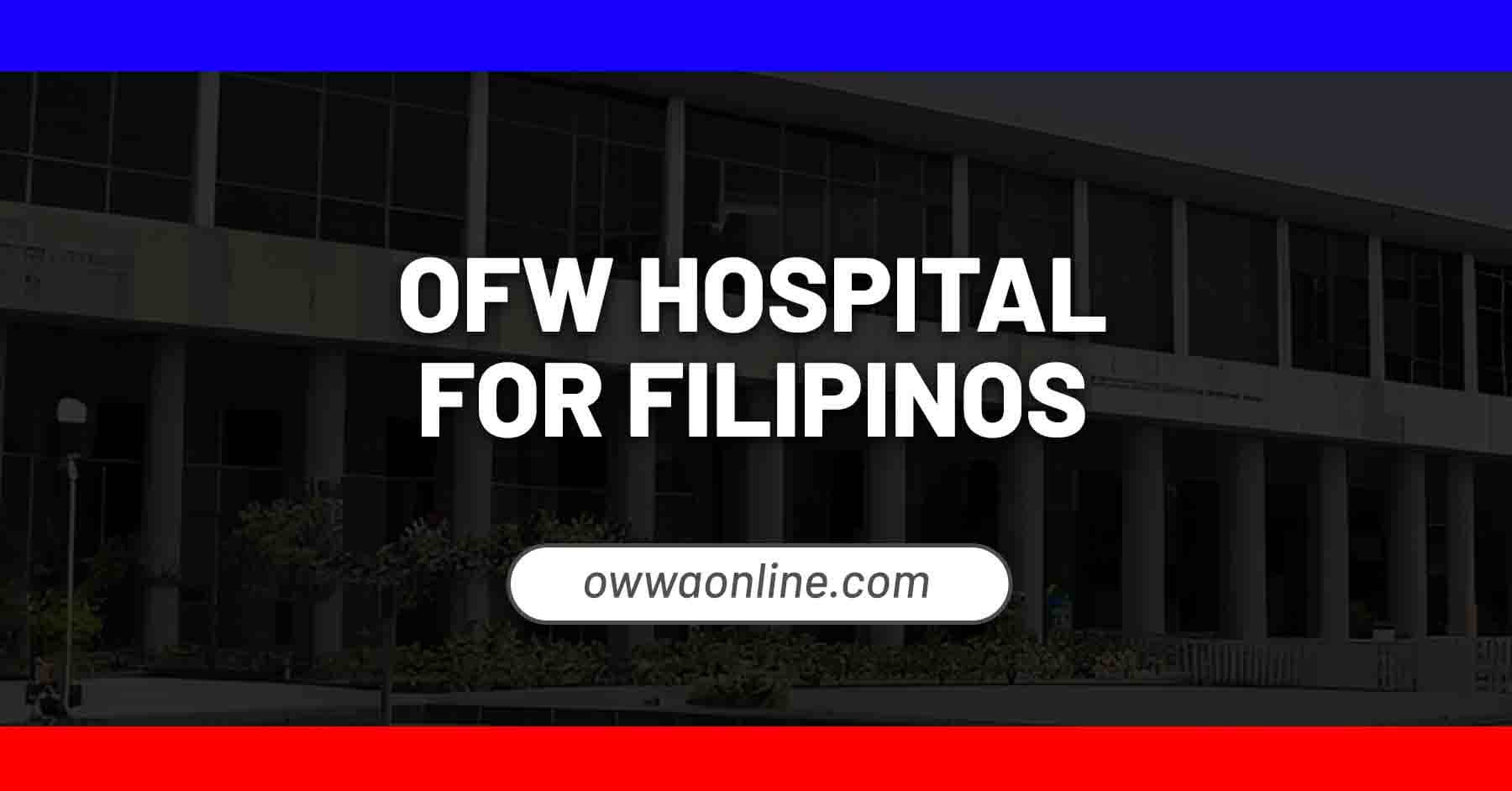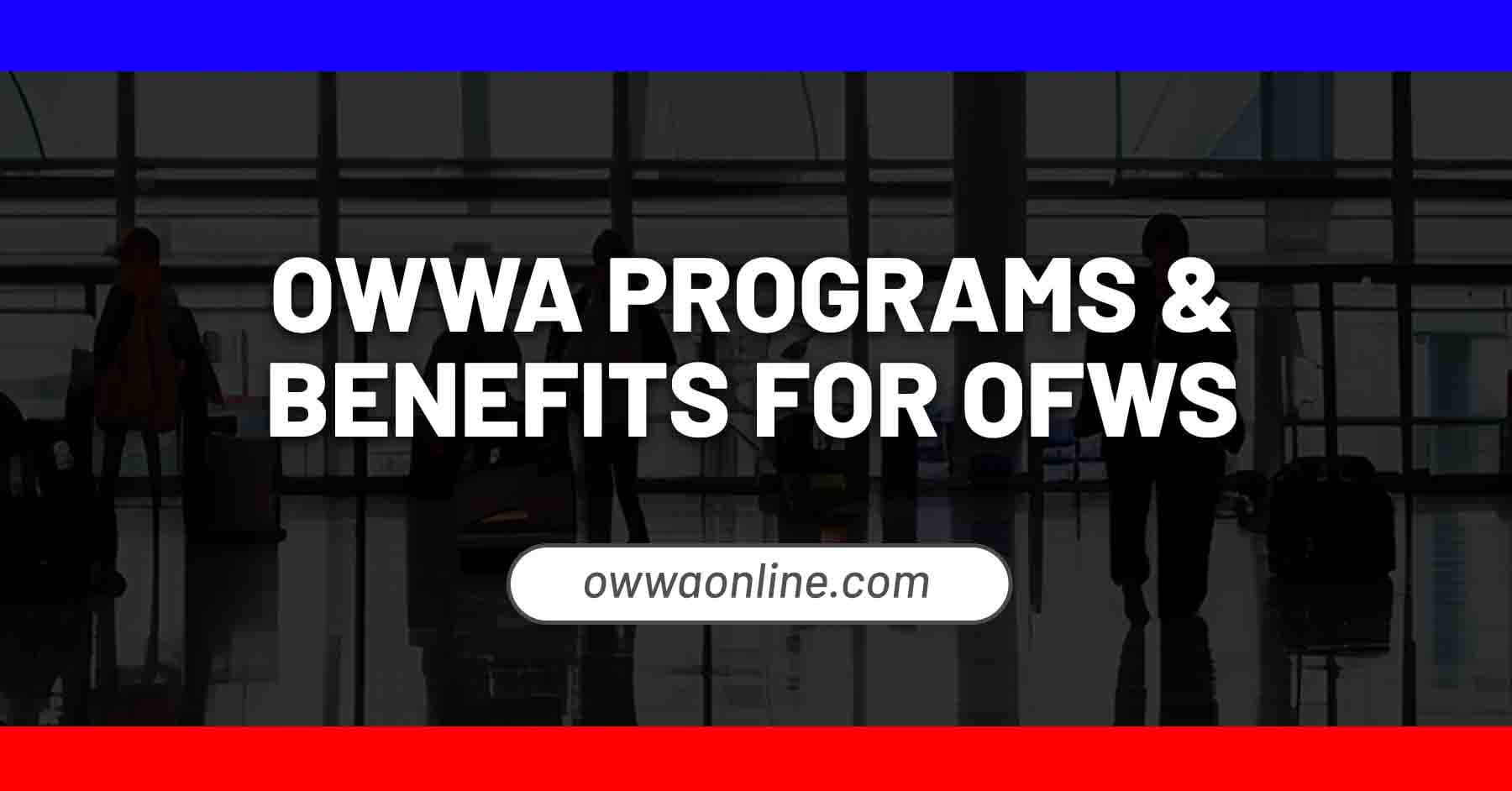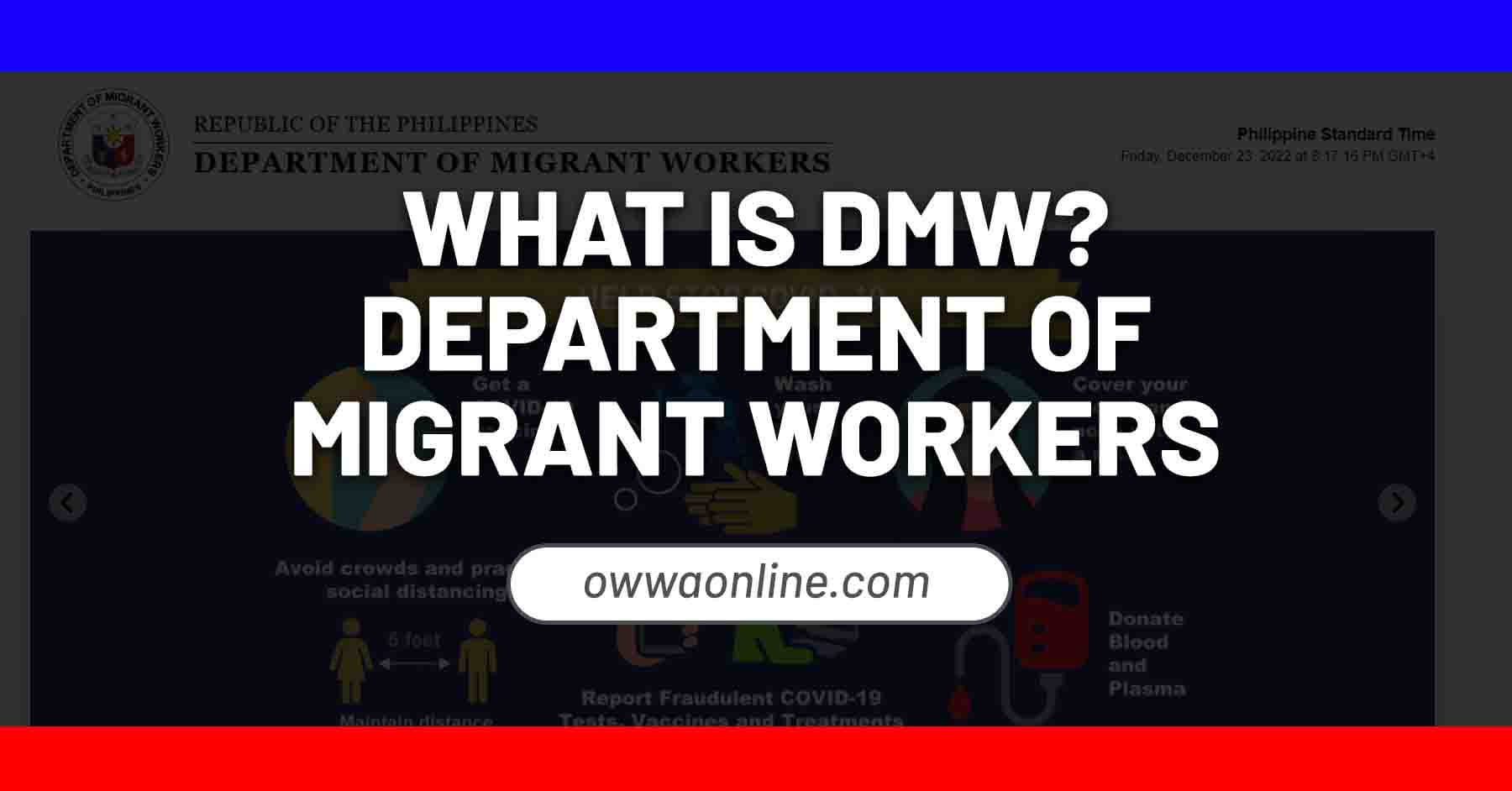In June 2022, the Overseas Filipino Workers (OFWs) and their families and eligible dependents received yet another type of assistance from the Philippine government—a privileged service type of support, delivered in the form of OFW-exclusive medical care by the newly-opened Overseas Filipino Workers (OFW) Hospital.
The Overseas Filipino Workers (OFW) Hospital and Diagnostic Center (OFW Hospital) is a newly-opened specialized polyclinic in San Fernando, Pampanga. It was built by the Duterte administration in an effort to provide medical care to current and former Modern-Day Heroes—the OFWs—and their dependents, especially those who cannot afford the cost of private hospital care. The OFW hospital offers a wide range of facilities and services, and if you are interested to learn more, then this guide is for you.
What is the OFW Hospital?
The Overseas Filipino Workers (OFW) Hospital and Diagnostic Center, otherwise known as OFW Hospital, is the most recent and world’s first-ever specialized medical facility launched to address the growing need for specialized, comprehensive, and total health care services exclusively for OFWs.
It was designed to offer medical care in the form of specialist services—internal medicine (IM), surgery, obstetrics-gynecology (OB-GYNE)—as well as psychological counseling, and social work services to the Filipino migrant worker population.
Since its initial operation, it mainly offers outpatient services. But once it receives its license to operate from the Department of Health (DoH), it will expand its operations and start treating more diseases. It will also provide free consulting services for a variety of chronic diseases and ailments, including diabetes, hypertension, leprosy, and skin care, among others.
Purpose of the OFW Hospital
For now, the OFW Hospital is sticking to its purpose to serve and provide free, high quality medical care and health services to OFWs and their families on a limited status. Nevertheless, it still serves its purpose in ensuring that they are physically and mentally fit enough to do the job they are leaving the country for.
It also offers free medical examinations and other healthcare services to OFW dependents, especially to those who cannot afford private medical services. It also serves as an important referral hospital for Filipino citizens who need it.
OFW Hospital Facilities
The OFW Hospital is a seven-story, 100-bed, level 2 government hospital erected in a 1.5-hectare land donated by the provincial government of Pampanga. It comes with an outpatient clinic, an inpatient ward, a pharmacy, and a laboratory, and was specially designed to serve Overseas Filipino Workers (OFWs) and the immediate members of their families.
At present, the OFW hospital is operating as a polyclinic, mainly handling ordinary treatments and outpatient services. However, once the Department of Health grants the hospital with a license to operate, it will start admitting in-patients. It will also house a “Malasakit Center and Overseas Workers Welfare Administration desk” to help address any concerns.
The OFW Hospital is also slated to open 30 more beds in partnership with Jose B. Lingad Memorial General Hospital and Philippine General Hospital (PGH). This will expand its operations into an infirmary. Once it happens, it can already accommodate people with various illnesses and minor surgeries.
According to the reports, once the OFW Hospital becomes fully operational, more medical equipment like Magnetic Resonance Imaging (MRI), Computerized Tomography (CT) scan, dialysis equipment, and other medical devices worth Php200-million in total will be brought in.
Who can avail of the services of the OFW hospital?
The services of the OFW Hospital is available to those who wish to use the hospital services via either PhilHealth or OWWA, provided that they meet the following conditions:
- Filipino who have worked or are working overseas
- Land-based or Sea-based OFW
- OFWs whether active or inactive and undocumented at OWWA
- No age limit
- OWWA contributors
The following may also avail of the medical services offered by the OFW Hospital as an eligible dependent:
- OFWs legal spouse,
- OFWs minor or incapacitated child
- OFWs parents (who mostly rely on the support of member-OFWs)
- If the OFW is single: minor sibling
In essence, all OFWs, whether active or inactive, and their families may seek medical care at the OFW Hospital. Whether they are active or inactive OWWA members or are eligible dependent of such, they may still avail of the same service provided that they can submit the required documentation.
Benefits of OFW Hospital
Some of the most prominent advantage of the development of the OFW Hospital in Pampanga include:
- Basic healthcare services
- All-inclusive medical treatment
- Curative and preventive treatment options
- Preventative medical measures like vaccination programs
- Equal access to high quality healthcare for OFWs and their dependents
- Easier and more convenient access to medical care especially for OFWs
- Specialized access to medical care for OFWs who work in occupations with a high risk of illness or injury,
- Great help to foreign workers and their dependents who do not have access to appropriate medical care in their home countries
- Less expenses for both OFW and employer
- Less chance for missed work or delayed schedule due to sickness or injury
- Less problems with poor physical condition of workers
- More productive and healthier employees
OFW Hospital Programs and Services
For OFWs, it is important to stay healthy. At some point, you will need to go home and visit a hospital to either get checked or get treated. When you do, you’ll find the benefits that having the world’s first dedicated OFW Hospital entails. It’s groundbreaking enough that an all-exclusive medical facility for migrant workers exist. What’s even more impressive is the fact that the facility offers programs and services specially designed to assist injured or ill OFWs.
Since it launched, the OFW hospital has been offering the following outpatient programs and services to OFWs and their eligible dependents:
General Consultation
General consultations refer to a 15 to 30-minute session with a doctor where the doctor monitors the development of the patient’s condition, treats existing illnesses or disabilities, prevents current or potential health problems, improves life and movement, and generally extends the patient’s life for as long as possible. During these sessions, doctors are expected to hear out and address the patient’s complaints and offer advice on all available treatment options.
Diagnosis
Diagnosis is one of the main service all hospital offers. It is no different for the OFW Hospital. During diagnosis, doctors take into consideration all the symptoms and complaints that patients have in order to figure out their disease or condition and recommend the best treatment options.
Laboratory
Diagnosis will never be complete without laboratory services. Sometimes, it may be hard for even specialists tomake conclusive diagnosis without the help of definitive lab test results. Thanks to the lab service offered by the OFW Hospital, patients requiring such tests do not need to look elsewhere to avail of the services. In cases when lab tests results end up requiring the OFWs to seek specialist services, the OFW Hospital is also equipped with people who can make referrals to specialists.
Additionally, the hospital offers a wide range of services to help OFWs with their daily lives. Some of the other services offered by the OFW Hospital to OFWs include:
- Free medical and dental service
- Free medication
- Free laboratory tests
- Free x-ray
- Free ultrasound
- Dental extraction (free)
- Dental implant (free)
- Free consultations on various health insurance plans and programs
- Coverage for pre-existing diseases
- Coverage for pregnancy
- Free medical assistance
Note: Before visiting the OFW Hospital, OFWs or their eligible dependents are required to schedule a consultation appointment via the following appointment link: https://appointment-ofwhospital.owwa.gov.ph/
How to Book an Appointment at the OFW Hospital
If you need medical care, booking an appointment for the OFW Hospital is easy and convenient. Plus, it ensures that you will get the care you need without any problems. If you need to learn how to book an appointment for a visit to the OFW Hospital, here’s a simplified list of steps that you can follow:
- Visit the OFW Hospital appointment page at https://appointment-ofwhospital.owwa.gov.ph.
- Choose the preferred site and program
- Choose your preferred date of appointment for your visit.
- Key in your personal information.
- Confirm your appointment.
Once you have a confirmed appointment, you may take a screenshot for your reference. You may then visit the OFW hospital on the scheduled date and time of your appointment.
Video: Inauguration of the World’s First Ever OFW Hospital
The Philippine’s OFW Hospital is the world’s first specialized hospital exclusively for OFWs and their dependents. It offers programs and free medical services to OFWs as detailed in the video below:
Frequently Asked Questions
For questions regarding the “OFW Hospital,” here’s a list of the most frequently asked questions and answers:
1. What is the OFW Hospital?
The OFW Hospital is a hospital developed specifically for the OFWs and their dependents. It offers basic healthcare services and laboratory tests, especially for those who need medical certificates required before overseas deployment.
2. What is the purpose of the OFW Hospital?
The OFW Hospital was created for a single purpose: To provide free and accessible medical treatment and health services to OFWs, their dependents, and other patients who may have been referred to the hospital either by an OFW or an international recruitment agency.
3. What are the services offered by the OFW Hospital?
The OFW Hospital offers free medical and dental care, free insurance policy consultations, as well as general consultations, laboratory and imaging diagnosis, medical assistance, and specialist referrals.
At full capacity, the hospital is expected to be able to provide care for approximately 400 patients per day, with a total of 17 usable wards, 10 consultation rooms, and 7 examination rooms. The hospital will also feature brand-new medical facilities, an outpatient clinic, an X-ray department, a laboratory, and a pharmacy that offers reasonably priced and discounted medicinal options. In addition, there are plans to expand their services in the future to include services like physiotherapy and other forms of therapy, in order to give their patients a higher level of care.
4. Does the hospital offer free medical examinations to OFWs?
Yes, the hospital offers free medical exams. This includes all additional specialized exams that sponsors or employers may require on top of the pre- and post-employment medical examinations.
5. Does the hospital provide emergency medical care for patients from foreign countries?
Yes. As long as the patient is eligible and qualified for the benefits of the services of the OFW Hospital, they can avail of the emergency medical care even if they are from foreign countries.
6. Can non-OFWs be admitted to the OFW hospital?
Yes. Patients who are non-OFW but have been referred to the hospital by an overseas worker or by a company that places workers overseas are also qualified to receive healthcare services from the OFW Hospital. The hospital is also equipped to provide healthcare services to Filipinos who are stationed overseas in official capacities as well as OFW dependents and the dependents of Filipinos serving in the military or working for foreign government offices.
7. Does the OFW Hospital require an appointment?
Yes. Booking an appointment is required at the OFW Hospital. The hospital can only accommodate a maximum of 30 people daily so it’s best to ensure that you arrive in time for your scheduled appointment.
8. What is the OFW Hospital’s office hour?
Except on holidays, the OFW Hospital in the city of San Fernando, Pampanga is open from 8:00 am to 3:00 pm, Mondays through Fridays.
9. How is it funded?
Through a memorandum of understanding (MOU) with the Department of Health, the Philippine Overseas Health Workers’ (POHW) Welfare Fund—a non-stock, non-profit business that offers health care benefits—is expected to provide financial support for the construction of the very first OFW Hospital in the country. It will also receive support from a technical working group of medical professionals from public hospitals such as the Philippine General Hospital (PGH), the National Kidney and Transplant Institute (NKTI), the Lung Center of the Philippines (LCP), and the University of Santo Tomas Hospital Foundation Incorporated (UST Hospitals Foundation Inc.) who have been providing medical services to OFWs for years.
10. Will the OFW hospital make my OWWA membership fees worth it?
Yes. As an active OWWA member, you may also take advantage of the services available at the OFW Hospital as an additional OWWA membership benefit. Having said that, your OWWA membership also entitles you to the programs and services offered at the hospital and it will help you save on hospital and healthcare fees that you would otherwise need to pay for at other medical facilities.
Summary
The OFW hospital is the world’s first-ever hospital designed specifically for OFWs. Itoffers high-quality medical care to OFW and their eligible dependents at this hospital. Though it isn’t operating at full capacity just yet, the OFW Hospital can already serve as a lifeline for many OFWs who have fallen ill or have been injured while working abroad, especially if they do not have the capacity to avail of medical services from private healthcare facilities. With its brand-new and modern facilities combined with compassionate medical staff, the OFW Hospital is slated to become a truly a first-of-its-kind world-class institution.
The hospital is expected to also house a “Malasakit Center and Overseas Workers Welfare Administration desk” to help address any concerns. It is also slated to open 30 more beds in partnership with Jose B. Lingad Memorial General Hospital and Philippine General Hospital (PGH). This will expand its operations into an infirmary with more medical equipment like Magnetic Resonance Imaging (MRI), Computerized Tomography (CT) scan, dialysis equipment, and other medical devices worth Php200-million in total will be brought in.
Additionally, in order to provide their patients with a greater level of care, there are plans to expand the hospital services to incorporate new medical modalities including physiotherapy and other types of therapy.
For now, the Overseas Filipino Workers (OFW) Hospital is a medical facility catering to the healthcare needs of OFWs and their families. While it does offers a wide range of free services including but not limited to general medicine, and outpatient services like general consultation, diagnostics (laboratory and imaging), and referral to specialists, the OFW hospital is slated to offer treatment options for in-patients. It will also offer other medical services for other types of injuries and diseases
Contact Information
The OFW Hospital is committed to providing quality healthcare services to its OFW and OFW dependent patients and we hope that you will find the information presented in this guide helpful and enlightening. In case you need to reach out to them for any reason, you can contact them at:
Overseas Filipino Workers (OFW) Hospital and Diagnostic Center (OFW Hospital)
Office Address: OFW Hospital, McArthur Highway, Bgy. Sindalan San Fernando, Philippines
E-mail Address: ofwhcares@gmail.com
Official Website: https://ofwhospital.owwa.gov.ph/
Official Facebook Page: https://www.facebook.com/OFW-Hospital-101593242553179/


